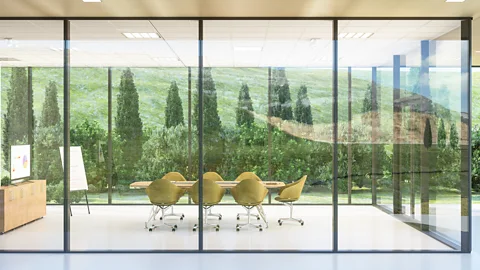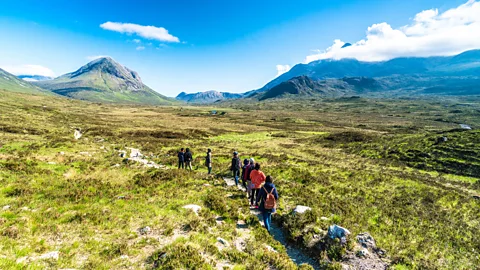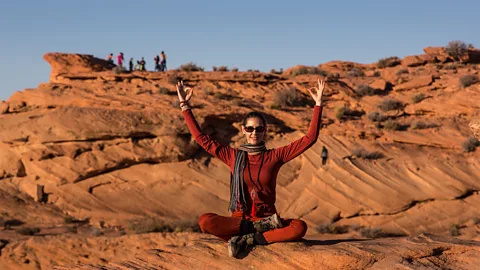Could a ‘workcation’ change how you think?
 Getty Images
Getty ImagesInstead of struggling to create a hard barrier between work and life, maybe it’s time to combine them. Especially if the goal is to think big.
Out in the mountains of Harper’s Ferry, in the US state of West Virginia, Alexis Grant has spent the past few months getting ready. In mid-May, before the COVID-19 outbreak, she was planning to host a group of 10 women from across the US in her town, an hour outside of Washington D.C., for five days of residency in an historic inn, with guided hikes on the Appalachian Trail, catered local meals and even a hot-stone massage.
But Grant’s programme isn’t about escaping work. It’s about getting deeper into it.
Grant, the founder of Retreat & Create, is a former media executive turned consultant who’s among a growing group of people trying to foster productivity and big-picture thinking with ‘workcations’.
Think of it as the much more intense, alluring relative of the one-day company offsite, when a team goes down the street to a dismal hotel lobby. And different still from a regimented whole-company retreat with large group work. Instead, workcations deliberately include warm weather or lots of nature, taking you somewhere you want to be mostly isolated. In different, more congenial surroundings, the theory goes, you’ll be better able to think.
Blurring the line
Work-life balance is often about the struggle to create clear delineation between our careers and our personal lives.
It’s becoming increasingly difficult, however, to draw a hard line – especially with emails rolling in and Slack messages constantly popping up. No matter what we promise ourselves, many of us are guilty of pencilling in at least a little work while we’re away. And while uninstalling messaging from your phone while on holiday is one possible solution, it’s a pretty drastic measure for a little peace and quiet.
 Getty Images
Getty ImagesThat’s where workcations come in. Instead of trying to build a wall between work and personal life, workcations lean into the idea that they’re not separate at all. It’s not quite the same as digital nomadism, in which you work where you please but still focus on your day-to-day tasks. Workcations are instead conscious efforts to separate yourself from your permanent environment, and get extremely focused on one element of your job. You step away with the explicit intention to ignore the daily churn.
Some workcations focus on certain activities with a schedule – say, yoga classes or skiing – while others are more freeform, mainly about getting into different physical environments. The integration of nature is often a big part; not only is it relaxing, but it’s shown to boost productivity, mind-wandering creativity, and promote mental restoration lost to distraction.
“We know that putting people in different environments, such as being close to nature, can make you more creative. It makes you less stressed. It can give you a different perspective in terms of your brain thinking out of the box,” says Libby Sander, assistant professor of organisational behaviour at Bond Business School in Australia. “There’s even research that shows that high ceilings and different types of buildings can change our thinking.”
Apart from guided hikes and some meals, Grant’s Retreat & Create programme is unstructured, which means that attendees can blend – or separate – their work and personal time as they like, and can choose to stay isolated from other attendees or brainstorm with them.
For the most part, the workcation attendees don’t know each other. Grant is hosting one pair, but most are singles in leadership positions who’ve come to get space from their teams. Attendees generally come with the intention to hack away at something the day to day doesn’t enable them to get deep into.
The idea, however saccharine, is to walk away with some sort of epiphany.
Thinking big
Jules Taggart, owner of San Diego, California-based marketing agency Wayward Kind, takes a workcation every four to six months. Among other places, she’s been to Orlando in the state of Florida, and Phoenix in the state of Arizona, and integrates activities such as swimming or running and getting spa treatments. Workcations have been a major source of creativity, she says: On one trip, she rearranged her entire client workflow and project management as a result. “It allows me to do a little more dreaming about the trajectory of the whole business.”
 Getty Images
Getty ImagesIt’s like a tab on your browser you’ve been meaning to get to forever, says Megan Flatt, a California-based consultant. On one workcation she addressed “something I’d been thinking about for a long time, and just having a conversation with somebody else and actually coming to a conclusion – it was like being able to close down that tab.”
The physical distance promotes free-flowing thought, too, says Simon Knox, emeritus professor of brand management at Cranfield School of Management in the UK. He says that your office environment can link you to the churn of everyday tasks, so changing your scenery can temporarily put a psychological fence around the things that stress you, freeing up mental bandwidth.
Sander agrees: There’s a lot of “anchoring” in the office with structure and routine, she says. Her research shows that if you want to think differently, it’s essential to be freed from your office environment and have a chance to focus without distraction or interruption.
The inextricable link
It’s a major privilege, however, to be able to remove yourself from an office or structured obligations for a week, and pay a fee to do it, too. Grant’s programme costs approximately $1,800 (£1,430), for example, which may be out of reach to many. Plus, if you’re not the boss making his or her own rules, taking a workcation will be on your dime – and cost you vacation days during which you should be shutting off.
The fact that something like a workcation even exists is, in some ways, problematic: it encourages an even blurrier line between work and life, Sander says, and can make you feel that you shouldn’t disconnect even during a holiday that’s meant strictly for pleasure.
Even workcation-creator Grant acknowledges that workcations create the psychological permission to blend work and holiday. Part of the stress of working while you’re on holiday is feeling wrong dipping into work. But Sander says that workcations can give you justification or even create a compulsion to work while sipping a cocktail poolside – which, no matter how you position it, is still work.
That we even needworkcations reflects how work has become stifling, says Sander: it’s impossible to get focused, creative thinking done, especially in poorly designed offices and on hyper-collaborative teams.
“It’s a really bad situation we’ve gotten into,” she adds. “You need to have time to not only switch off, but even get bored and empty your brain out.”
Make your own adventure
Forking over vacation days and cash doesn’t work for most. But you may be able to replicate some of the benefits of a little retreat without the investment.
You can try to make a workcation in your own home; the removal from the office environment alone can create that break from the tasks you obsess about daily. Even in a coffee shop may work, too. Though there may not be relaxing, sweeping vistas, you still may be able to achieve deep focus or creative thinking.
“When you’re outside of the office, your brain isn’t consciously attending to the conversations. They’re unlikely to be about you,” says Sander. “In the office, your brain is constantly switched on because you think ‘that’s something I need to know’ or ‘this might be about me’.”
Whether you embark on a huge workcation or make your own mini version, Flatt says that its success depends on turning off the multitasking and separating yourself from a regimen. Unlike highly scheduled office offsites, which often programme hourly activities, the key to unlocking just may be in letting yourself dream.
